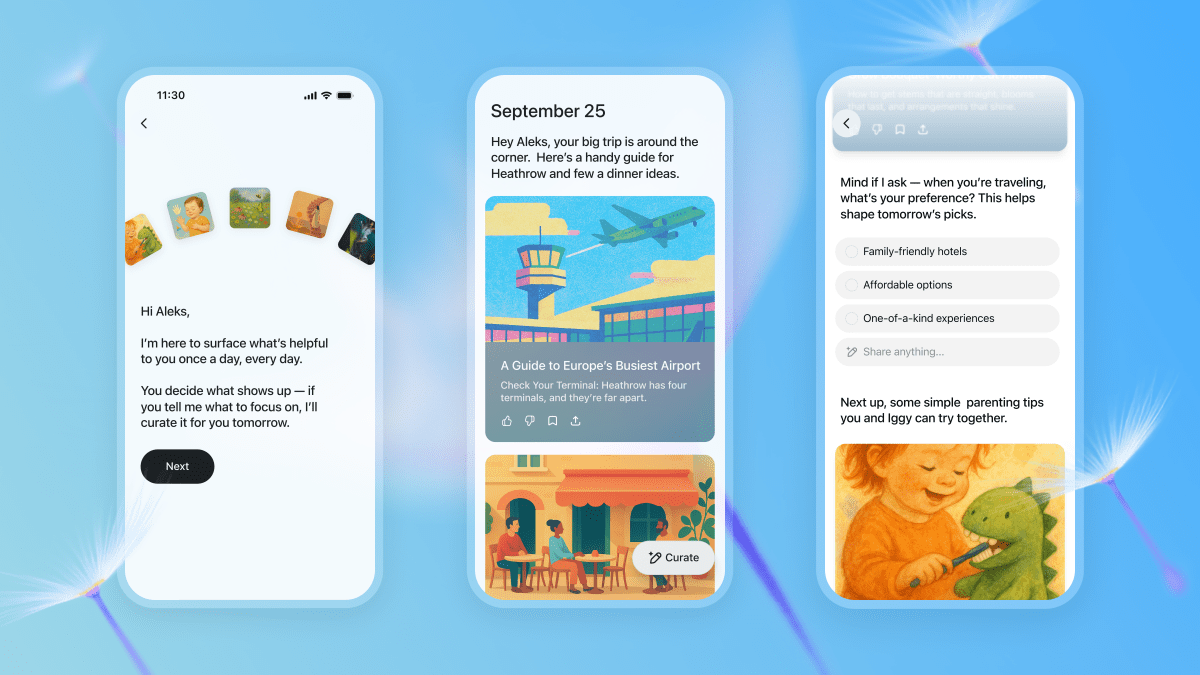OpenAI is launching a new feature inside of ChatGPT called Pulse, which generates personalized reports for users while they sleep. Pulse offers users five to ten briefs that can get them up to speed on their day, and is aimed at encouraging users to check ChatGPT first thing in the morning — much like they would check social media or a news app.
Pulse is part of a broader shift in OpenAI’s consumer products, which are lately being designed to work for users asynchronously instead of responding to questions. Features like ChatGPT Agent or Codex aim to make ChatGPT feel more like an assistant rather than a chatbot. With Pulse, OpenAI seemingly wants ChatGPT to be more proactive.
“We’re building AI that lets us take the level of support that only the wealthiest have been able to afford and make it available to everyone over time,” said OpenAI’s new CEO of Applications, Fidji Simo, in a blog post. “And ChatGPT Pulse is the first step in that direction – starting with Pro users today, but with the goal of rolling out this intelligence to all.”
OpenAI CEO Sam Altman said earlier this week that some of ChatGPT’s new “compute-intensive” products would be limited to the company’s most expensive subscription plan — which is the case for Pulse. OpenAI has previously said it’s severely limited in the number of servers it has to power ChatGPT, and it’s rapidly building out AI data centers with partners like Oracle and SoftBank to increase its capacity.
Starting Thursday, OpenAI will roll out Pulse for subscribers to its $200-a-month Pro plan, for whom it will appear as a new tab in the ChatGPT app. The company says it would like to launch Pulse to all ChatGPT users in the future, with Plus subscribers to get access soon, but it first needs to make the product more efficient.
Pulse’s reports can be roundups of news articles on a specific topic — like updates on a specific sports team — as well as more personalized briefs based on a user’s context.
In a demo for TechCrunch, OpenAI product lead Adam Fry showed several reports Pulse had made for him: a roundup of news about British soccer team Arsenal; group Halloween costume suggestions for his wife and kids; and a toddler-friendly travel itinerary for his family’s upcoming trip to Sedona, Arizona.
Techcrunch event
San Francisco
|
October 27-29, 2025
Each report is displayed as a “card” featuring AI-generated images and text. Users can click on each one to get the full report, and can then query ChatGPT about the contents. Pulse will proactively generate some reports, but users can also ask Pulse for new automated reports or offer feedback on existing ones.
A core part of Pulse is that it stops after generating a few reports and shows a message: “Great, that’s it for today.” According to Fry, that’s an intentional design choice to make the service different from engagement-optimized social media apps.
Pulse is compatible with ChatGPT’s Connectors, so users can connect apps like Google Calendar and Gmail. Once that’s set up, Pulse will parse through your email overnight to surface the most important messages in the morning, or access your calendar to generate an agenda for upcoming events.
If users have ChatGPT’s memory features turned on, Pulse will also pull in context from previous chats to improve your reports. OpenAI’s personalization lead, Christina Wadsworth Kaplan, gave an example of how Pulse automatically picked up on her love of running to create an itinerary for her upcoming trip to London that included running routes.
Wadsworth Kaplan described Pulse as a “net-new functionality” for a consumer product. As a pescatarian, she says Pulse takes dinner reservations on her calendar and finds menu items that work with her diet.
But it’s hard to overlook how Pulse could compete with existing news products, such as Apple News, paid newsletters or traditional journalism outlets. Fry doesn’t expect Pulse to replace the various news apps people use, and the feature cites its sources with links in the same way ChatGPT Search does.
It remains to be seen if Pulse is worth the computational power it requires to work. Fry says the service can “vary tremendously” in how much computing power it spends on a given task — for some projects, it’s fairly efficient, but others may require searching the web and synthesizing lots of documents.
Eventually, OpenAI would like to make Pulse more agentic, to the point where it could make restaurant reservations on a user’s behalf, or draft emails that users could approve to be sent. But such features may be a long way out, and would likely require OpenAI’s agentic models to improve a great deal before users would trust it with such decisions.
